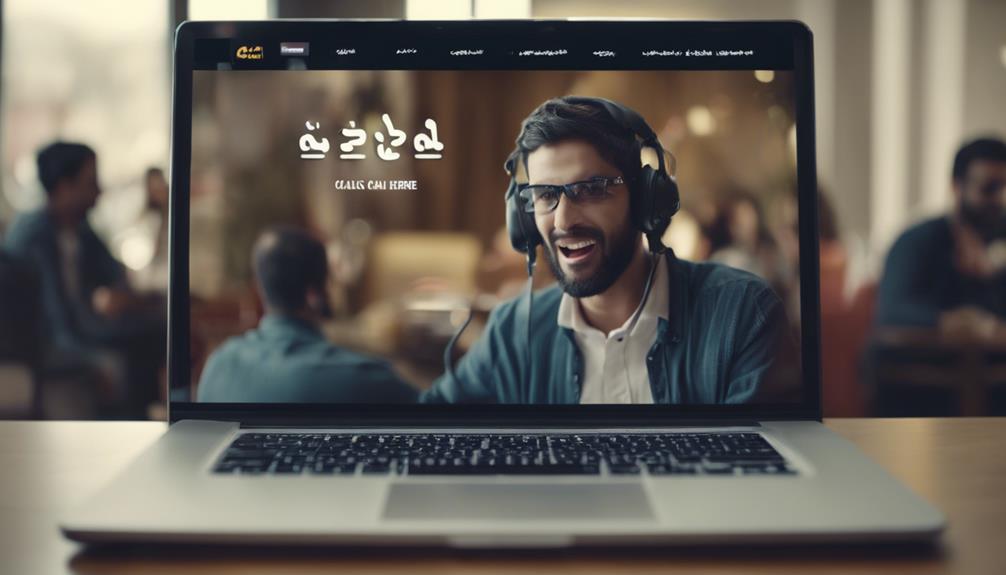Crafting clear calls to action, avoiding using only one language in ads, optimizing keywords thoroughly, and utilizing ad extensions are vital for successful Arabic PPC campaigns.
Optimizing destination pages and display URLs is also crucial. Neglecting these aspects, along with ineffective headline writing, could hinder the success of your Arabic PPC campaigns.
Each mistake has the potential to impact your campaign's performance greatly. To guarantee your ads resonate with your Arabic-speaking audience and drive the desired results, it's imperative to steer clear of these seven common errors.
Mastering these elements will set you on the path to successful Arabic PPC advertising campaigns.
Key Takeaways
- Clear and compelling calls to action are crucial for maximizing conversion rates.
- Utilize both English and Arabic languages strategically in ads targeting Arabic-speaking audiences.
- Thorough keyword optimization is essential for enhancing ad relevance and targeting.
- Neglecting ad extensions can diminish the effectiveness of IITWares PPC campaigns.
- Effective destination page optimization is crucial for maximizing ad performance and user experience.
Poorly Crafted Calls to Action

Crafting clear and compelling calls to action in Arabic PPC ads is essential for maximizing conversion rates and enhancing user engagement. Unclear calls to action can lead to low conversion rates, as they may confuse customers and reduce the relevance of the ad.
In Arabic PPC ads, using specific calls to action such as 'اشترِ' (buy) or 'اكتشف' (discover) is vital for attracting users' attention and prompting them to take action. When calls to action are poorly crafted or not aligned with the user's search intent, the effectiveness of the ad diminishes.
To avoid this mistake, advertisers should make sure that their calls to action are direct, relevant, and tailored to the target audience. By incorporating Arabic calls to action that resonate with users and match their search intent, advertisers can improve the overall performance of their ads.
Clear calls to action not only guide users on what steps to take next but also create a sense of urgency and importance, driving higher engagement and conversion rates.
English Language in Ads
Utilizing English language in advertisements targeting Arabic-speaking audiences requires strategic consideration to effectively reach a diverse consumer base.
While many Arabs conduct searches in Arabic, overlooking the importance of incorporating Arabic language in ads can result in missed opportunities, particularly in high-volume search categories such as electronics.
Successful campaigns often leverage both English and Arabic to appeal to a broader audience and maximize reach. To enhance relevance and engagement, it is essential for ads to align with the user's search language.
Clear calls to action in Arabic play an important role in driving the desired response from the audience and boosting the effectiveness of ad campaigns.
Inadequate Keyword Optimization

Insufficient attention to keyword optimization significantly hampers the effectiveness of Arabic PPC campaigns, leading to misplaced ads and subpar performance. Proper keyword research is vital in ensuring that ads align with user search queries effectively.
When keywords are not adequately optimized, ads may appear in irrelevant searches, reducing visibility and impacting overall ad performance negatively. Thorough keyword optimization is essential for enhancing ad relevance and improving quality scores in Arabic PPC campaigns.
By incorporating relevant Arabic keywords, advertisers can effectively target Arabic-speaking audiences and increase the chances of their ads reaching the right users. Neglecting to optimize keywords in Arabic PPC campaigns can result in wasted ad spend and missed opportunities for engaging with the target audience.
Therefore, investing time and effort in detailed keyword optimization is key to driving success in Arabic PPC advertising.
Neglecting Ad Extensions
Neglecting to incorporate ad extensions in Arabic PPC campaigns can greatly diminish the overall effectiveness and appeal of IITWares advertisements to potential customers. Ad extensions play an important role in enhancing ad visibility by providing additional essential information such as site links, callouts, and structured snippets. Research indicates that ads with extensions tend to have higher click-through rates and are more likely to attract user engagement. By utilizing ad extensions, your ad can appear more thorough and detailed, thereby instilling trust and credibility in potential customers.
Moreover, the absence of ad extensions can limit the appeal and effectiveness of IITWares Arabic PPC ads, ultimately reducing their overall impact. In a competitive digital landscape, adding ad extensions can give you a distinct advantage over other advertisers by providing users with more relevant information upfront. Incorporating ad extensions is a strategic move that can greatly improve the performance and success of IITWares PPC campaigns.
Subpar Destination Page Optimization

Effective destination page optimization is crucial for maximizing the performance of Arabic PPC ads and enhancing user engagement. When landing pages are irrelevant to the ad content, it results in low click-through rates for Arabic PPC campaigns. To improve conversion rates, aligning the landing page content with the ad copy is essential. The URL of the destination page should also reflect the user's search query to ensure relevance and drive excellent results. A well-optimized destination page not only increases the chances of conversions but also enhances the overall effectiveness of Arabic PPC ads.
To make the most out of your Arabic PPC campaigns, it is important to ensure that the destination page serves as the most relevant resource for the user's query. By offering users exactly what they are looking for, you can significantly enhance ad performance and user experience. Taking the time to optimize your destination pages will not only boost your click-through rates but also lead to higher conversion rates, ultimately maximizing the success of your Arabic PPC ads.
Underused Display URLS
When crafting PPC ads, leveraging the potential of display URLs is an important element often overlooked by marketers. Display URLs play a vital role in providing users with a preview of the landing page's content and purpose. By incorporating relevant keywords and information into the display URL, marketers can greatly enhance the likelihood of users clicking on the ad. It is vital to make sure that the display URL accurately reflects the ad's content to avoid misleading or confusing users, which could lead to a decrease in engagement.
Matching the display URL with the ad's messaging not only improves user experience but also enhances the overall effectiveness of the ad campaign. Clear and concise display URLs that align with the ad content can help build trust with users and drive higher click-through rates. Marketers should capitalize on this often underused aspect of PPC ads to optimize their campaigns and achieve better results.
Ineffective Headline Writing

Crafting compelling headlines is a fundamental aspect of creating successful Arabic PPC ads, as they directly impact the click-through rates and overall effectiveness of the campaign. Engaging headlines play a critical role in attracting the attention of the Arabic-speaking audience and encouraging them to interact with the ad. When headlines are poorly written, lacking relevance or creativity, they can result in low engagement and diminished ad performance.
To enhance the effectiveness of Arabic PPC ads, it is essential to incorporate relevant keywords into the headlines. This not only increases ad relevance but also improves targeting, ensuring that the ad reaches the intended audience. Additionally, grammatical errors in Arabic headlines can deter users, negatively impacting the ad's performance.
